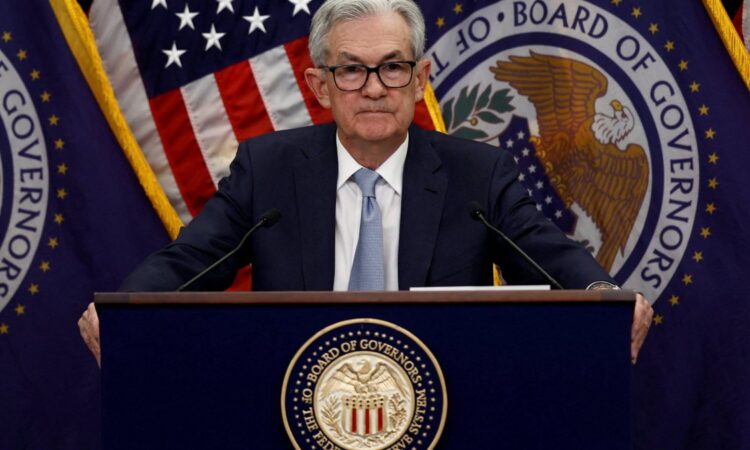
The US Federal Reserve has increased its target interest rate by a quarter of a percentage point.
The increase lifted the US central bank’s benchmark interest rate, which influences most consumer and business loans including credit cards and mortgages, to 4.50-4.75 per cent, the highest since November 2007.
Jerome Powell, the Federal Reserve Chairman, warned that despite strong signs US inflation is easing there was “still a lot of work to do” and future interest rate rises would be necessary.
He said inflation forecasts showed inflation going on longer and did not foresee interest rates coming down in 2023.
“We are living in a period of significant uncertainty. Inflation is still running hot. We have to complete the job and we are not there yet,” he said.
“Inflation is going down. We are going to be cautious. This is a unique situation. We are not going declare victory [over inflation] yet. We do not see interest rates going down this year but if the situation changes and inflation comes down quicker we will look at that again.”
The US rise, the latest of a series of steep increases which started last March, will be watched closely by rate setters at the Bank of England (BoE) who decide today whether or not to raise interest rates here.
The UK central bank is expected to increase the interest base rate 0.5 percentage points, from 3.5 to 4 per cent as it tries to bring inflation down from its current 10.5 per cent.
The BoE is anxious to avoid pushing the UK into a recession by raising borrowing costs but its mandate is to keep inflation at around 2 per cent.
The International Monetary Fund said this week it expected the UK to fall into recession this year because of high energy prices, rising mortgage costs and increased taxes, as well as labour shortages.
The rate of inflation eased to 10.5 per cent but it remains close to a 40-year high as UK households continue to be squeezed by the cost of living crisis.
The European Central Bank (ECB) is also expected to match the BoE hike tomorrow after figures yesterday showed core inflation in the eurozone remained at an all-time high of 5.2 per cent last month.
More from Business
Economists said the US Fed was able to slow the rapid interest rate rise this month because recent figures showed American workers’ wages are not rising as rapidly as originally feared and consumer spending has moderated and manufacturing output has weakened.
Major US companies including Amazon, Walt Disney, Microsoft and Facebook owner Meta are laying off tens of thousands of employees.
Delivery firm FedEx announced last night it was cutting one in 10 of its managers worldwide.
US inflation, excluding food and energy, fell to 4.4 per cent last month from 5.2 per cent in September. The Fed acknowledged improvements but gave no indication interest rates are close to their peak. Inflation remained “elevated” it warned.
The rate-setting committee, led by Jerome Powell, said “ongoing increases” in interest rates “will be appropriate in order to attain a stance that is sufficiently restrictive,” to hold back the US economy and rein in inflation.
Share prices on Wall Street fell lower after the US Fed decision. The S&P 500 was 0.2 per cent lower while the Dow Jones was down or 0.7 per cent. US financial markets expect at least one more 0.25 percentage point increase before interest rates peak.





